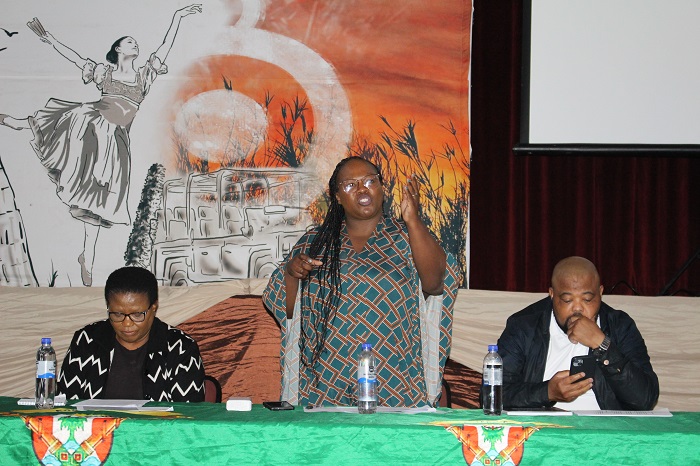By ‘Odidi Matai-Sigudla
Dozens of Makhanda politicians and community members turned out at City Hall on 14 July for public hearings on the Expropriation Bill. The Bill is designed to create a legal framework for the government to expropriate land when this is in the public interest, paying “just and equitable compensation” when it does so, or even no compensation at all in certain cases.
Makana Municipality Speaker Mabhuti Matyumza said the Makana municipality welcomed the proposed new law, because “it speaks directly to how the land of this country will be managed in the interest of the people. To me, this is democracy because public participation affirms such bills of this nature, they actually give a good signal to the people’s power. Because the power is the (community)…you are the ones who demonstrate that power through your vote.”
Eastern Cape member of the provincial legislature (MPL), Zinziswa Rabe of the ANC, who chaired the meeting, agreed that mandatory public participation in law drafting was important. Community members Phindiwe Piko and Manezi Mbeju raised concerns about past problems they had experienced with their own land. Makhanda resident Zola Sintwa said it was far too easy to evict people from farms, and the bill did not prevent this. ANC Councillor Ramie Xonxa of Ward Two in Makhanda also spoke on the broader issue of shack demolitions.
“In the places that we live, we are struggling. Here you see people say here’s land and they build shacks, and we see people being forcefully removed even though there is nothing being done with the land, and they are told that no, the land belongs to a person overseas,” said Xonxa.
Ndlambe Ward 10 Councillor, Nadine Haynes, of the DA said she did not support the bill because the whole process was flawed.
“I don’t believe that it helps any beneficiaries. I don’t believe that it’s managed correctly,” Haynes said, saying that several highly productive farms had fallen idle after being expropriated. “One drives from Port Alfred to East London, and you see almost 150km of land that just lies there, and people say, we don’t have land. Asinayo umhlaba, sifun ‘umhlaba. There’s umhlaba, imile pha, ayisetyenziswa,” said Haynes.
Ignoring Rabe’s request for Councillors to only comment on the Bill, Ndlambe Municipality proportional representation councillor Sikhumbuzo Venene, also of the DA, posed the question, “Why is it that, coming from 1994, we are still discussing the issue of land? When we talk about land, it makes you feel, even touch you. Because you know the history of the land. Until people in government positions can grant the deserving parties the land they are supposed to get, I won’t support the Bill”, said Venene.
In response, Matyumza explained that the Bill was not designed to deal with land claims but rather provide for the government to be able to access land when it was needed. He urged the government to change Clause 3 of the bill which grants compensation to private landowners when their land is expropriated. Comments on the Bill can be submitted before 11 August 2023, to Committee Coordinator N. Maninjwa via email: nmaninjwa@ecleg.gov.za or contact 040 608 0003 / 082 040 4450.
Copies of the Bill can be found on www.eclegislature.gov.za


